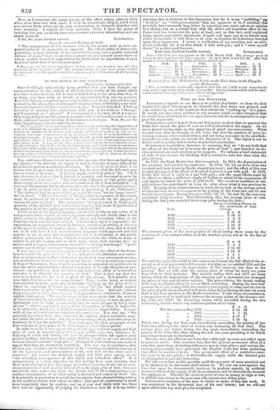NOTE BY THE SPECTATOR.
IcNonAsics appeals to our fairness to publish this letter : we from the first intended to allow him to speak for himself—his first letter was printed, and only omitted by one of the accidents that attend the " making-up " of a paper. It would not have been omitted on any account could we have imagined that he would have attributed its non-appearance to a desire to misrepresent or sup- press his arguments.
IGNORAMUS quotes largely from our first paper, to show that we asserted the Corn-laws raised the price of corn as well as diminished the supply. As we never denied having done so, this apparatus of proof was unnecessary. What we said was, that we thought it did both ; but that the question of price in- volving so many other considerations, and not being necessary to the establish- ment of our main point, we waived the discussion of it. Our object is not to debate curious points, but to arrive at practical conclusions.
IGNORAMUS is mistaken, however, in assuming that we do not hold that the effect of the Corn lawis to raise the price of food"; and therefore we de- cline printing any such erratum as he suggests. We subjoin a brief statement of some of our reasons for thinking that a restrictive corn-law does raise the price of corn. In 1797, the Bank Restriction Act was passed. In 1814, the depreciation of the currency had reached its maximum. In 1814, '15, '16, no fewer than two hundred and forty Country Banks stopped payment; and the effect of thie was to raise the paper of the Bank of England nearer to a par with gold. In 1819, Peel's Bill raised it quite to a par with gold; and the great efforts made by
the to obtain a sufficient supply of bullion to admit of the resumption of cash payments raised the price of gold itself. The excellent condition of our gold coinage has contributed to keep its value above what it was previous to 1797. Keeping these circumstances in mind, let us look at the average prices of corn previous to and subsequent to the passing of the Corn-law, not for one but for several years. During the years 1815, '16, '17, '18, and '19, the currency continued rising in value. Notwithstanding this, the average price of corn during the last years exceeded its average price during the first— Prices of middling Wheat, by the Audit-book of Eton
Year. College.
s. d.
1815 3 16 0 1817 4 2 0 7 5 16 0 1818 4 18 0 1819 3 18 0 The account given of the average price of wheat during these years by the receivers of corn-returns differs as to the absolute prices, not as to the fact of a rise- £ a. d.
1815 3 4 4 1817 3 15 10 7 4 14 9 1818 4 4 1 1819 3 13 0
We omit the years after 1819 in this statement, because the full effect of the re- sumption of cash payments had then come into play, as we omitted 1814 and the preceding years because the depreciation of the currency was then at the greatest. But we will state the average price of wheat for every ten years from 1786 to 1825 inclusive. The decades ending 1805 and 1815 are those during. which the depreciation of the currency and a protracted war deranged the prices of corn and all other articles. The prices during the decade ending 1795 were unaffected either by war or Bank-restriction. During the first four years of the decade ending 1825, the currency rose rapidly in value, and the rise in the price of gold above adverted to kept its value higher during the last six years than it had been previous to the Bank-restriction. Under these circumstances, a comparison may be instituted between the average prices of the decades end- ing 1795 and 1825: the disturbing causes which prevailed during the two intervening decades render any such comparison of no value.
a. d.
The ten years ending 1795 2 14 3
PP „ 1805 4 1 2i „ 1815 4 17 6
PP
„ 1825 3 18 8fr Prices rose during the four years immediately succeeding the passing of the Corn-law, although the value of money was increasing all that time. The average price was higher during the ten years immediately succeeding the passing of the Corn-law, than during the last ten years preceding it for which any comparison can be instituted.
This has been the effect of our Corn-law—although we were not called upon to prove so much. Our assertion was, that the general permanent effect of a corn-law, apart from disturbing influences, was to raise prices ; and various dis- turbing causes might have prevented the English Corn-law from producing that effect for a series of years. The permanent effect of a restrictive corn- law must be to raise prices : it diminishes the supply while the demand goes on (if population goes on) increasing.
We will not return to this question until the prospect of some practical end to be obtained by its discussion shall induce us. We rest our case against the Corn-law upon its demonstrable tendency to produce scarcity by artificial means, to diminish the supply of all the necessaries, and to diminish the demand for employment. Whether the nominal price of corn in money be high or low, is of little importance to the poor man who cannot earn either price. IGNORAMUS complains of the tone in which we spoke of him last week. It was occasioned by the dictatorial tone of his own letters; but we will not again afford Lim any such plea for complaint.


























 Previous page
Previous page